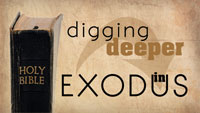 Have you ever heard the Ten Commandments read at a funeral? How about Leviticus? No? Ever thought about why not? Does Leviticus warm your heart? What do you normally hear at funerals? Psalm 23?
Have you ever heard the Ten Commandments read at a funeral? How about Leviticus? No? Ever thought about why not? Does Leviticus warm your heart? What do you normally hear at funerals? Psalm 23?
Psalm 23 is a Hebrew poem about The Good Shepherd who, in grace, provides rest, food, water, and protection, for His sheep. The truth of Psalm 23 about The Good Shepherd, which David, a shepherd, wrote, had long been established before David ever lived.
What was the original occupation of God’s people starting with Abraham? Abraham was a nomadic shepherd. Abraham was the first to be guided along by God, then Isaac, and Jacob. Jacob in His old age actually says in Gen 48:15, “The God before whom my fathers Abraham and Isaac walked, The God who has been my shepherd all my life to this day.” God dealt with His people in ways they could understand. He related to His people in grace first as a Shepherd. That is true in Exodus as well before the Law was given. Let’s dig a little deeper to see.
Imagine what it would have been like to have just been rescued in the Exodus. You had seen this God who devastated the Egyptian nation with plagues, killed the first born of the Egyptians, and wiped out the Egyptian armies by hurling the Red Sea at them. And now, He wants you—but for what purpose? Now you are “captive” by this incomparable God. You go from one harsh task master Pharaoh, to another with infinitely more fierce power. You question. Is He harsh? What will He do to me? What does He want with me? Will he hurl a mountain at me like He hurled the sea at them?
What did the former slaves need to see about their new Master? If you were one of them, wouldn’t you need to see a demonstration of the new Master’s inherent goodness? For trust to take place, wouldn’t you need to know that all that power He wields is for the good of His people? That is exactly what happens in Exodus 16-18. Chapters 16-18 reflect God’s good shepherding of His people—His grace in dealing with His people.
The Israelites who were slaves must now be transformed into servants of the one true infinitely powerful but good God. They must learn to trust Him. A theme that occurs in this narrative is one of “testing.” Yahweh will test the people (Exodus 16:4) and the people test Yahweh (Exodus 17:2,7). Yahweh is the one who passes the test as the good providing shepherd. The Israelites will need to jettison their slave mentality and learn how to be sons and daughters who trust their good Father. .
If you read Exodus 16-18 carefully you will see that Yahweh, the good shepherd, will provide rest, food, water, protection, and even a “table” (Exodus 18:12) in the presence of God’s people’s enemies in these chapters. So we have Psalm 23 in Exodus! Or is it Exodus in Psalm 23? Thus, there is grace first in Exodus.
Only after God has demonstrated His incomparability and His inherent goodness, did He give the people the Law (Exodus 19-24). After His grace was shown, God’s righteous instructions in living (“The Law”) came in order to teach His people to reflect His incomparability and goodness to the rest of the world.
It has always been grace first despite what you may think about the OT and Exodus, Leviticus, Numbers, Deuteronomy.
 Church
Church